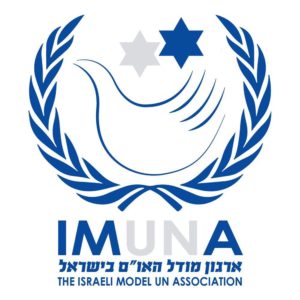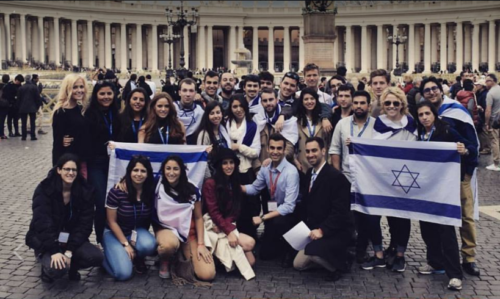Introduction to IMUNA

I have done everything from delegating all the way to heading societies and conferences. I am the Director of Academics for the Israeli Model UN Association, and I wanted to share with the MUN community a bit about how we work and learn about how your societies tackle the same issues.
The Israeli Model UN Association (IMUNA) is the national umbrella organization for all collegiate level Model UN activity in Israel. We coordinate between 11 different societies in Israeli academic institutions and work to develop opportunities for all of our students. In the academics department we work on maintaining a high academic level across the board – from the conference chairing staff to the rules of procedure, as well as providing a training platform for society coaches and academic staff at conferences.
There are several challenges that must be overcome when planning events in the Israeli circuit. One of the largest ones is that we cannot monopolize the weekends for conferences. The country as a whole, as well as IMUNA in particular, keep the Sabbath, and no events may take place during it. This leads to holding conferences during the week, which must then be balanced with work and university classes. The most notable impact can be seen in the lengths of the conferences, which are typically only 1-2 days. At least once a year we hold a week-long international conference.
Academics Under One Umbrella
As the umbrella organization for Model UN in Israel, our organization has worked on a number of initiatives to guarantee a high academic standard, while limiting common headaches for conferences, societies, and delegates alike.
The entire circuit operates on one agreed upon Rules Of Procedure. This makes life a lot easier for everyone instead of having to learn new rules in preparation for each conference. Additionally, we have a nationally recognized set of judging standards that encompasses what is considered towards awards and what is not. This helps limit a lot of confusion and frustration.

More than anything, the association sets out to ensure quality chairing staff for its conferences. To that end we maintain a detailed database of certified Chairs and Vice Chairs, as well as collecting and offering to chairing staff feedback after conferences from everyone from the Delegates to the Secretariat in order to help them learn and improve.
We put a big emphasis on the training our chairs undergo to make sure they are properly prepared and well versed. The full process involves 5 stages as detailed below.
A note about the IMUNA Chairing structure – in our conferences, committees are typically lead by 1 Chair and 2 Vice Chairs under the Chair’s discretion.
The IMUNA Chair Certification Process
- Delegating – Before you can start your chairing career you must have delegated a certain amount of times. This helps ensure a solid base of delegating experience on which students can build on from the point of view of a committee Chair.
- Selection Tests – Students come to IMUNA to receive their Chair training from several different academic institutions and with widely varying backgrounds. This leads to a need to make sure everyone can meet a certain academic level. The Selection tests measure the student’s knowledge in the Rules Of Procedure, Resolution Writing and more. This stage helps us make sure the students have attained the necessary basic skills as a delegate and are ready, at least academically, to move forward with their Chair training.
- Workshop – The Chair workshop is a one day event where students from across the country gather to go through various lessons which will help set the stage for them as successful chairs. The lessons include a review of the Judging Standards, how to give effective feedback, and Chair Scenarios where we discuss events than can come up during a debate – and how to tackle them.
- Vice Chairing and Feedback – After the workshop, students must serve as Vice Chairs a minimum of once, but as many times as they feel they need, before being eligible for the next step. After each conference they receive individual feedback about their performance from three perspectives – the Delegates, the other Chairing Staff, and the Secretariat (usually the USG Academics of the conference).
- Graduation Panel – Once a student has fulfilled the minimum requirements and feel comfortable in with the role, they fill out an application detailing all of their experience and references. The application is reviewed by an experienced panel of students and the references are contacted for input. Upon successful recommendations, the applicant is approved as officially certified by IMUNA as a Model UN Chair.
In Israel we have worked hard to offer our students a structured and organized certification and education path to leading their committees, a path which we are constantly improving. If you have any interesting ideas or proven techniques, please let us know about them in the comments below.
Hoping to see you folks at a Model UN conference in Israel soon!


